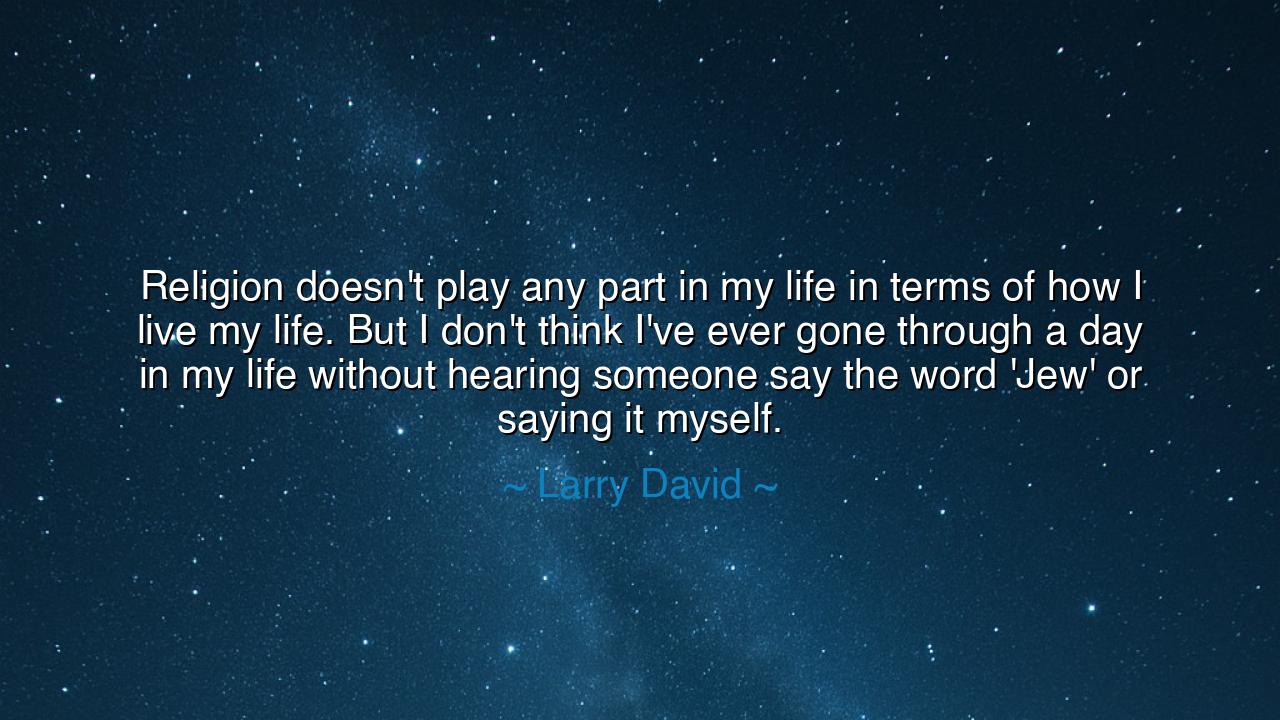
Religion doesn't play any part in my life in terms of how I live
Religion doesn't play any part in my life in terms of how I live my life. But I don't think I've ever gone through a day in my life without hearing someone say the word 'Jew' or saying it myself.






In the intricate dance of identity, there is often a tension between the personal and the collective, between the individual’s choices and the labels imposed upon them by society. Larry David, the renowned comedian, speaks candidly of this tension when he says, "Religion doesn't play any part in my life in terms of how I live my life. But I don't think I've ever gone through a day in my life without hearing someone say the word 'Jew' or saying it myself." These words reveal a profound truth—that identity, particularly religious or cultural identity, is not always something we actively choose or embrace, yet it follows us nonetheless, shaping our daily interactions and experiences.
The struggle between personal identity and social labels is an ancient theme. In the times of the Greeks and Romans, individuals were often defined by their tribe, birthplace, or even their occupation, whether they liked it or not. The famous philosopher Socrates was often identified by his city-state, Athens, and his philosophical ideas, but he was much more than the labels placed upon him. His life was a search for wisdom, for understanding beyond the identities given to him by birth. Yet, no matter how much he sought to define himself, he was always shaped by the views of those around him. David's words echo this struggle—the desire to live authentically, free from the weight of labels, while being constantly reminded of the identity that the world imposes upon us.
In the ancient Hebrew tradition, the identity of the Jew was both a source of deep pride and painful alienation. The people of Israel were chosen, set apart, but this distinction came at a price. Moses, the great leader, was not only a prophet but also the representative of a people whose identity was tied to their faith and their history. Moses’s own journey of self-discovery was inseparable from the identity of the Jewish people—he could not separate himself from the tribe, even if he tried. In his leadership, Moses helped his people navigate the difficult tension between personal autonomy and collective identity. This tension, as David articulates, continues to play a profound role in modern Jewish life, where the identity of being a Jew is constantly thrust upon the individual, even when they may not adhere to the religion or its practices.
The story of Anne Frank also offers a powerful example of how identity can be imposed upon an individual. Anne, like David, might not have considered herself particularly religious in her early life, yet she was undeniably shaped by the Jewish identity imposed upon her by the world. Her diary, written in the quietude of hiding during the Holocaust, revealed not just the terror of living in fear but also the complexity of identity—how it shaped her daily existence, her thoughts, and even her sense of self-worth. Despite her personal beliefs or lack thereof, Anne Frank could not escape the label of Jew that the world placed upon her, leading to her tragic fate. David's words mirror this struggle: he, too, cannot escape the constant reminder of his Jewish identity, whether he chooses to embrace it or not.
In the modern world, identity is often defined by external factors—by labels we inherit from our families, our cultures, or our histories. David speaks not just about religion, but about the label of being a Jew, a label that follows him wherever he goes, whether he actively identifies with it or not. This is the eternal challenge of identity—how do we define ourselves in a world that insists on defining us through labels and categories? David reveals that, despite our desire for individuality, we are often trapped in a world that insists on categorizing us based on the smallest of details, even something as fundamental as religion or ethnicity.
The lesson here is that identity is a complex and multifaceted aspect of the human experience. We may not always choose the labels that are placed upon us, but they inevitably shape our lives. The challenge, then, is not to resist or deny these labels, but to find the freedom to define ourselves beyond them. David teaches us that we must come to terms with the fact that the world will often try to define us in ways we may not agree with, but our power lies in how we respond to these definitions. We must not allow these labels to dictate who we are or limit our sense of self.
In our own lives, let us consider how identity shapes our daily existence. Do we allow the labels of religion, ethnicity, or social status to define us completely, or do we strive to live beyond them, embracing a more nuanced sense of self? Let us also remember that identity is not something fixed—it is fluid, ever-evolving, and ultimately shaped by our actions, beliefs, and the way we engage with the world. David’s words remind us that while we may be defined by the world, we have the power to define ourselves, and in doing so, we can live more authentically, beyond the constraints of the labels imposed upon us.






AAdministratorAdministrator
Welcome, honored guests. Please leave a comment, we will respond soon